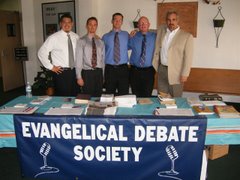BIRMINGHAM, Ala. — The divine Trinity — "Father, Son and Holy Spirit" — could also be known as "Mother, Child and Womb" or "Rock, Redeemer, Friend" at some Presbyterian Church (U.S.A.) services under an action Monday by the church's national assembly.
Delegates to the meeting voted to "receive" a policy paper on gender-inclusive language for the Trinity, a step short of approving it. That means church officials can propose experimental liturgies with alternative phrasings for the Trinity, but congregations won't be required to use them. "This does not alter the church's theological position, but provides an educational resource to enhance the spiritual life of our membership," legislative committee chair Nancy Olthoff, an Iowa laywoman, said during Monday's debate on the Trinity.
The assembly narrowly defeated a conservative bid to refer the paper back for further study.
A panel that worked on the issue since 2000 said the classical language for the Trinity should still be used, but added that Presbyterians also should seek "fresh ways to speak of the mystery of the triune God" to "expand the church's vocabulary of praise and wonder."
One reason is that language limited to the Father and Son "has been used to support the idea that God is male and that men are superior to women," the panel said.
Conservatives responded that the church should stick close to the way God is named in the Bible and noted that Jesus' most famous prayer was addressed to "Our Father."
Besides "Mother, Child and Womb" and "Rock, Redeemer, Friend," proposed Trinity options drawn from biblical material include:
— "Lover, Beloved, Love"
— "Creator, Savior, Sanctifier"
— "King of Glory, Prince of Peace, Spirit of Love."
Early in Monday's business session, the Presbyterian assembly sang a revised version of a familiar doxology, "Praise God from whom all blessings flow" that avoided male nouns and pronouns for God.
Youth delegate Dorothy Hill, a student at Gordon-Conwell Theological Seminary in Massachusetts, was uncomfortable with changing the Trinity wording. She said the paper "suggests viewpoints that seem to be in tension with what our church has always held to be true about our Trinitarian God."
Hill reminded delegates that the Ten Commandments say "the Lord will not hold anyone guiltless who misuses his name."
The Rev. Deborah Funke of Montana warned that the paper would be "theologically confusing and divisive" at a time when the denomination of 2.3 million members faces other troublesome issues.
On Tuesday, the assembly will vote on a proposal to give local congregations and regional "presbyteries" some leeway on ordaining clergy and lay officers living in gay relationships.
Ten conservative Presbyterian groups have warned jointly that approval of what they call "local option" would "promote schism by permitting the disregard of clear standards of Scripture."
Defending the Historic Evangelical Christian Faith in our postmodern and post-Christian times for the glory of Almighty God and the salvation of all peoples. We believe in the Trinity, the authority of the Bible alone, salvation is by grace alone through faith alone in Jesus Christ alone, based on the Bible alone for the glory of Almighty God alone, amen. Evangelical Debate Society Website: http://www.evdebate.com/
The Evangelical Debate Society

About Me
- The Evangelical Debate Society
- Lee Edward Enochs Chairman, The Evangelical Debate Society We are a Conservative, Bible based and Christ centered Evangelical Apologetics ministry dedicated to the defense of Evangelical Christianity and the promotion of the Gospel of Jesus Christ. We believe in the absolute and exclusive authority, inerrancy, infallibility and inspiration of the Bible in every respect and in all its parts. We believe the Bible is our only authority in all matters pertaining to Christian faith and practice including Christian Apologetics and debating. We believe in the doctrine of the Trinity, the full Deity of Jesus Christ, His virgin birth, sinless life and substitutionary atonement on the Cross of Calvary. We believe in the Protestant Reformation doctrine of justification by grace alone through faith alone in Jesus Christ alone based on the exclusive authority of the Bible alone all for the glory of God. We defend the Evangelical Christian faith likewise, all for the glory of God and believe that all men and women should repent of their sins and place their faith in Jesus Christ.
Blog Archive
-
▼
2006
(71)
-
▼
June
(22)
- American Episcopal rift over Gay Bishops Widens
- Who Shot Bobby Kennedy?
- Greg Bahnsen on Presuppostional Apologetics
- Is Superman America's Jesus Christ?
- Help End Abortion Now!
- In Defense of Martin Luther
- I am Theologian X
- Westminster Confession on Predestination
- Kurt Cobain, Nietzsche and the Kingdom of God
- Kurt Cobain: The Prophet of Destruction
- Is Your Theology Better than this?
- Just Say No to Pot: Should Marijuana be Legalized?
- Thought for the Day
- The Greatest Films of All Time
- Crisis in Anglican Church
- Presbyterians Suggest Gender-Inclusive Language in...
- Jesus Christ is Almighty God, the First and the Last
- Apologetics for the Glory of God
- My Thoughts on this Weekend's Debate
- Dr. Al Mohler Jr's Website and Blog
- Studies in the First Epistle of John
- Unitarians, Evolution and the Coming Debate
-
▼
June
(22)